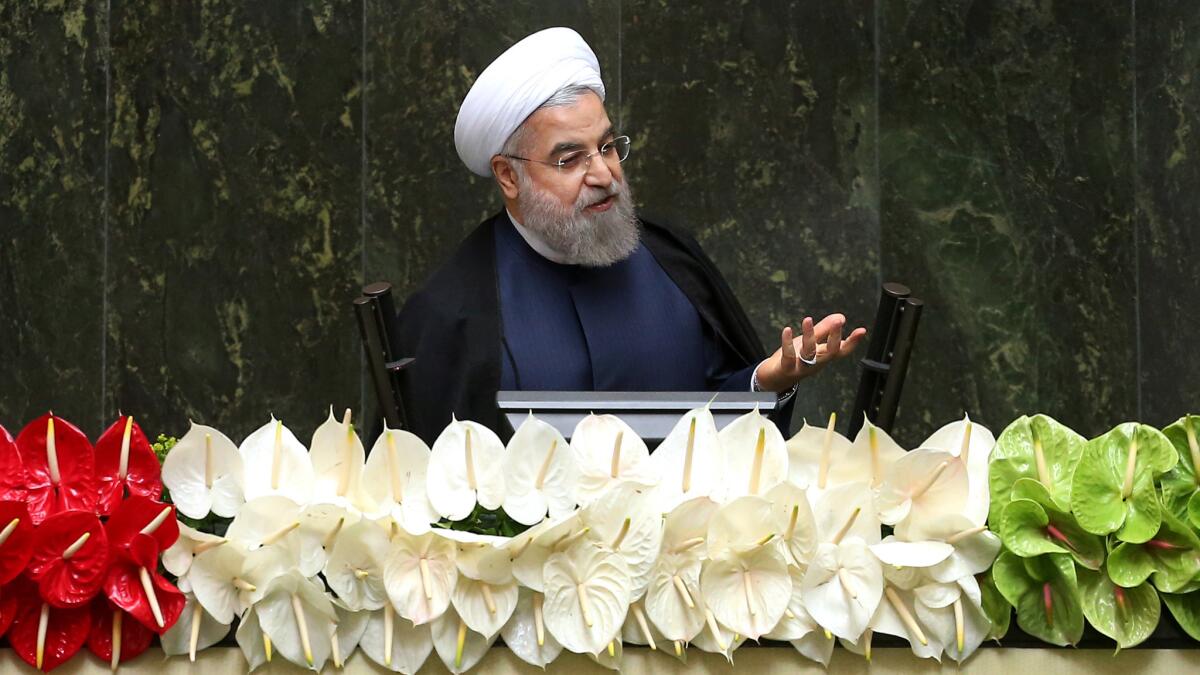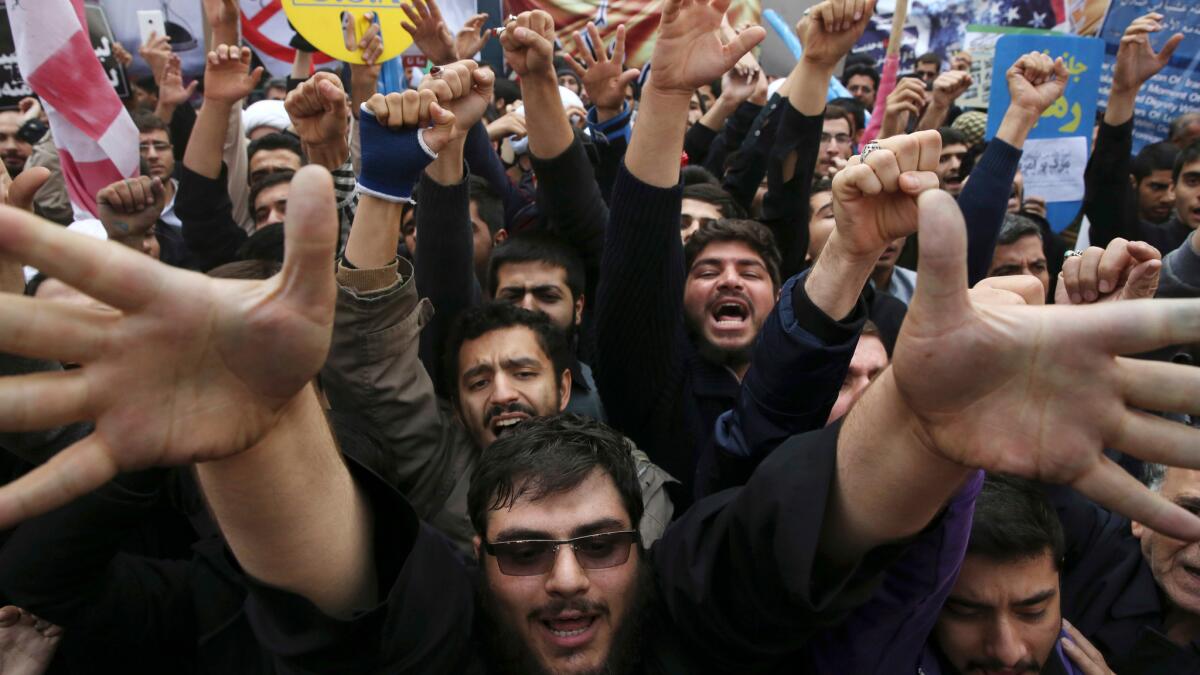One year after Iran nuclear deal, President Rouhani feels heat of corruption allegations

- Share via
Reporting from Tehran — When a young female Iranian lawmaker named Fatemeh Hossaini was swept into office as part of a pro-reformist wave in February’s parliamentary elections, it was supposed to be a signal of change in a country long led by a corrupt and overwhelmingly male elite.
But the substantial income of Hossaini’s family has dragged her into the middle of a widening national outcry over public-sector corruption that underscores Iran’s economic troubles.
As part of a series of leaks exposing high salaries among Iranian state-owned companies, Hossaini’s father, Safdar Hossaini, chairman of Iran’s sovereign wealth fund, was revealed to be earning more than $23,000 per month — dozens of times what the lowest-paid government workers earn.
Known as the National Development Fund of Iran, the fund is meant to reserve surplus oil and petrochemical revenues for development and economic emergencies. Safdar Hossaini resigned in silence along with his colleagues.
Then Hossaini’s husband, Hani Mirmohammad-Ali, a tile seller turned civil engineer, was accused of using family connections to get a license to operate a money exchange shop that has been implicated in money laundering.
A year after the Iranian nuclear deal was signed, the so-called “Payslip-gate” revelations are adding to a growing frustration at the lack of economic improvement under President Hassan Rouhani, who promised the historic pact would ease widespread unemployment and industrial decline.

In one indicator of the pressure on Rouhani, survey results released last week by IranPoll, a Canadian polling company with ties to the University of Maryland, showed that three-quarters of Iranians said there had been no economic improvement over the last 12 months.
When the nuclear deal was signed July 14 of last year, 63% of Iranians surveyed said they expected tangible economic benefits.
Although Hossaini has not been formally accused of wrongdoing, she was greeted with boos when she stood up in parliament last month to defend her father and husband. Unknown in politics before the election, she was accused by critics of using favoritism to get herself placed on the 30-member “List of Hope,” the slate of parliamentary candidates who supported Rouhani and swept all the seats in Tehran.
Hossaini did not respond to messages seeking comment.
Some Rouhani supporters worry that unless he takes action against his implicated allies, he risks losing a reelection bid next year.
“I, like many reformists, feel that we have been betrayed by some of the lawmakers,” said Farshad Qorbanpour, a journalist and activist who was jailed for participating in protests following the disputed 2009 elections.
“Hossaini and others were supposed to be a voice for the voiceless and fight injustice. Now it is revealed that some like her are in fact profiting from her political activities.”
Reform activists cheered the success of pro-Rouhani candidates in the February elections, in which moderates and reformists won major gains against conservatives who had dominated parliament for years. The election was seen as an endorsement of Rouhani’s outreach to the West and pursuit of the nuclear deal.
The release of salary information in recent weeks has exposed how top leaders in Iran’s cloistered public sector have profited despite — and in some cases because of — the years of Western sanctions that crippled the national economy.
The news has benefited hard-liners who oppose Rouhani. Iran’s supreme leader, Ayatollah Ali Khamenei, weighed in on the issue in his address last week to commemorate the Eid holiday, warning that “illegitimate payments” to managers of state-owned companies must be returned to the treasury.
“The managers earning illegitimate payments are few, but even a few corrupt managers are too many and their illegitimate payments must be confiscated,” Khamenei said.
Other critics of Rouhani also see a chance to pounce.
Ali Akbar Javanfekr, former media manager for conservative ex-President Mahmoud Ahmadinejad — seen as contemplating another run for office — pointed out that the revelations had not come during Ahmadinejad’s time.
The IranPoll survey found that Ahmadinejad now trailed Rouhani by just 8 percentage points in a head-to-head match up for president, compared with 27 points in May 2015.
“We wish President Rouhani had a chance to be reelected for a second term, but he has disappointed people and he has no chance,” the website Shomal News quoted Javanfekr as saying.
Special correspondent Mostaghim reported from Tehran and Times staff writer Bengali from Mumbai, India.
Follow @SBengali on Twitter for more news from South Asia
MORE WORLD NEWS
When does a rock become an island? It’s a key to the South China Sea case
Residents of impoverished Gaza Strip turn to Turkey for lifesaving medical care
More to Read
Sign up for Essential California
The most important California stories and recommendations in your inbox every morning.
You may occasionally receive promotional content from the Los Angeles Times.











